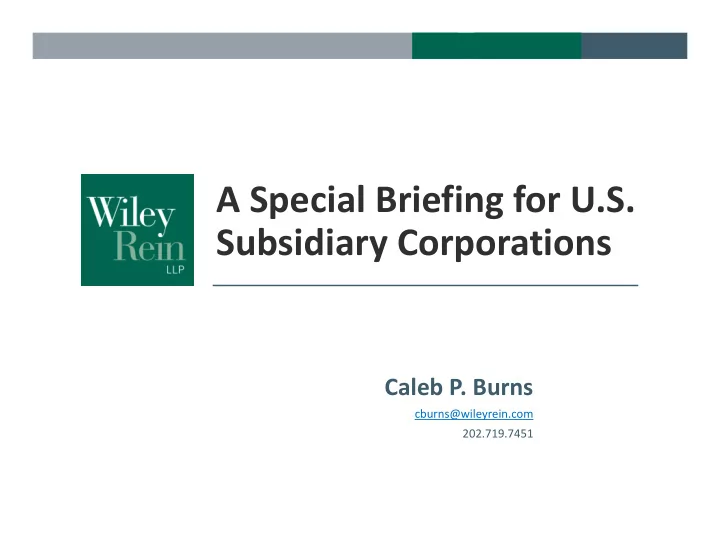

A Special Briefing for U.S. Subsidiary Corporations Caleb P. Burns cburns@wileyrein.com 202.719.7451
Topics Campaign finance law • Legal restrictions • Legislative developments Lobbying law • Requirements under the Lobbying Disclosure Act (LDA) • Requirements under the Foreign Agents Registration Act (FARA) • Legislative developments 2
Campaign Finance Law 3
Campaign Finance Law: Legal Restrictions Foreign nationals are prohibited from: • Making contributions and expenditures in connection with federal, state, and local elections; and • Participating in decisions involving election ‐ related activities of a company or PAC, including decisions concerning the administration of a PAC. 4
Campaign Finance Law: Legal Restrictions A “foreign national” is: • An individual who is neither – a U.S. citizen; nor – residing in the U.S. as a lawful permanent resident (i.e., a “green card” holder). • An entity that is – Organized under the laws of a foreign country; or – Has a principal place of business in a foreign country. This does not include U.S. subsidiaries that are organized under the laws of a U.S. jurisdiction and have their principal place of business in the U.S. 5
Campaign Finance Law: Legal Restrictions A U.S. subsidiary may make non ‐ federal political contributions – where permitted by state and local law – and administer a PAC provided that the U.S. subsidiary: • Has sufficient U.S. revenues to cover the costs; and • No individual who is a foreign national participates in the decision ‐ making. 6
Campaign Finance Law: Legislative Developments S. 1585 – Democracy Is Strengthened by Casting Light on Spending in Elections Act of 2017 “DISCLOSE Act.” • Sponsored by Sen. Whitehouse (D ‐ RI). • 45 co ‐ sponsors, no Rs. H.R. 1615 – Get Foreign Money Out of U.S. Elections Act. • Sponsored by Rep. Raskin (D ‐ MD). • 41 co ‐ sponsors, no Rs. 7
Campaign Finance Law: Legislative Developments Would classify as a foreign national –subject to the foreign national prohibitions – a company that, among other things: • Is 20% foreign owned; or • Where a foreign national “has the power to direct, dictate, or control the decisionmaking process of the corporation with respect to its interests in the United States.” 8
Lobbying Law 9
Lobbying Law: Requirements under the LDA A company registered under the LDA must disclose: • The name, address, principal place of business, amount of any contribution of more than $5,000 to the lobbying activities of the registrant, and approximate percentage of equitable ownership in the registrant of any foreign entity that, among other things— – holds at least 20 percent equitable ownership; or – directly or indirectly, in whole or in major part, plans, supervises, controls, directs, finances, or subsidizes the registrant’s activities. • The interest, if any, of the foreign entity in specific lobbying issues. 10
Lobbying Law: Requirements under the FARA A company must register and report under the FARA if it: • Engages in public relations, political, lobbying, or other related activities as • An “agent” of a foreign principal by, for example, taking direction or funding from a foreign principal. A company is not required to register under the FARA if: • It engages in “private and nonpolitical activities in furtherance of the bona fide trade or commerce of such foreign principal”; or • The foreign principal is not a foreign government or political party, and the company is registered under the LDA. 11
Lobbying Law: Legislative Developments S. 2039 – Disclosing Foreign Influence Act. • Sponsored by Sen. Grassley (R ‐ IA). • No co ‐ sponsors. H.R. 4170 – Disclosing Foreign Influence Act. • Sponsored by Rep. Johnson (R ‐ LA). • 7 co ‐ sponsors, 5 R, 2 D. 12
Lobbying Law: Legislative Developments Would remove the exception for FARA registration when a company is registered under the LDA. 13
Questions? 14
Recommend
More recommend